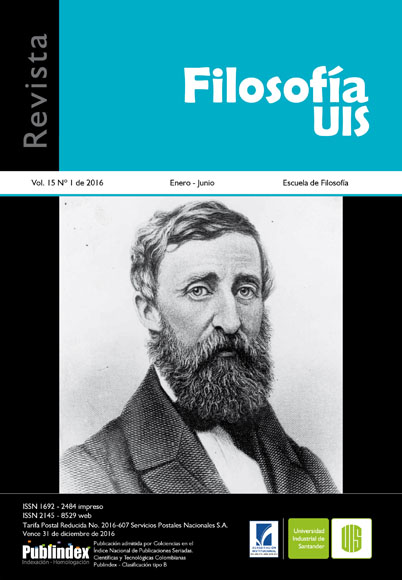Research Article
Friedrich Hayek: the theory of knowledge and the epistemic foundation for the criticism of planned economy
Published 2016-06-24
Keywords
- Hayek,
- knowledge,
- criticism,
- planned,
- economy
How to Cite
Indavera Stieben, L. G. (2016). Friedrich Hayek: the theory of knowledge and the epistemic foundation for the criticism of planned economy. Revista Filosofía UIS, 15(1), 89–195. https://doi.org/10.18273/revfil.v15n1-2016004
Copyright (c) 2016 Revista Filosofía UIS

This work is licensed under a Creative Commons Attribution 4.0 International License.
Abstract
Firstly, the aim of this paper is to analyse several Hayek´s writings in order to understand his conception of knowledge and in order to show how these conceptions are useful as a tool to set, partially, the foundations of free market and the denial of any economic planning. Secondly, Hayek´s ideas will be analysed in order to show how it is possible to build a subjective theory of value based on Hayek´s theory of knowledge.
Downloads
Download data is not yet available.
References
- Caldwell, B. (2004). Hayek's Challenge: An Intelectual Biography of F.A Hayek.
- Chicago & London: The University of Chicago Press.
- Connin, L. (1990). “Hayek, Liberalism and Social Knowledge”. Canadian Journal
- of Political Science, 23 (2).
- Gómez, R. (2003). Neoliberalismo Globalizad: Refutación y debacle. Buenos Aires:
- Macchi.
- Hausman, D. (1992). The inexact and separate science of economics. New York:
- Cambridge University Press.
- Hayek, F. (1967). Studies in Philosophy, Politics, and Economics. Chicago: University
- of Chicago Press.
- Hayek, F. (1979a). The Counter-Revolution of Science. Indianapolis: Liberty Press.
- Hayek, F. (1979b). The political Order of a Free People. Vol. 3 of Law, Legislation,
- and Liberty. Chicago: The University of Chicago Press.
- Hayek, F. (1980a). Individualism and Economic Order. Chicago: The University of
- Chicago Press.
- Hayek, F. (1980b). Individualism and Economic Order. Chicago: The University of
- Chicago Press.
- Hayek, F. (1981). Nuevos Estudios en Filosofía, Política, Economía e Historia de las
- ideas. Buenos Aires: Eudeba.
- Hayek, F. (1992). The Sensory Order. Chicago: The University of Chicago Press.
- Hayek, F. (1994). Hayek on Hayek: An Autobiographical Dialogue. Chicago: The
- University of Chicago Press
- Hayek, F. (2005). Camino de servidumbre. Barcelona: Alianza editorial.
- Horwitz, S. (2000). From The Sensory Order to the liberal order: Hayek's nonrationalist
- Liberalism. Review of Austrian Economics, 13 (1).
- Hutchison, T. (1981). The Politics and Philosophy of Economics: Marxians,
- Keynesians, and Austrians. Oxford: Blackwell.
- Duran, C. y Di Gregori, C. (2013). “La naturaleza de lo a priori y el elemento
- pragmático en el conocimiento” de Clarence Irving Lewis. Redes, 10 (20), 89-117.
- Recuperado de http://www.redalyc.org/articulo.oa?id=90702005
- Lawson, T. (2005). “The (confused) state of equilibrium analysis in modern
- economics: an explanation”. Journal of Post-Keynesian Economics, 27 (3).
- Luján, C. (2003). “El apriorismo de Ludwig von Mises”. Laissez–Faire, (18-19),
- -56.
- Ortiz, D. (2009). “El orden sensorial, individualismo y conocimiento económico
- en la obra de F.A. Hayek”. Revista de economía institucional, 11 (20).
- Popper, K. (1967). El desarrollo del Conocimiento Científico: Conjeturas y
- Refutaciones. Buenos Aires: Paidós
- Popper, K. (1985). La Lógica de la Investigación Científica. Buenos Aires: REI.
- Pozo, J. (1992). Teorías Cognitivas del aprendizaje. Madrid: Morata.
- Rosicka, J. (2002). “Liebniz's Science on Economy. Economic Security versus
- Economic Scarcity”. En Actas del VII Internationaler Leibniz-Kongress. Nihil Sine
- Ratione, Hannover.
- Scarano, E. (2004). “El Apriorismo de Ludwig Von Mises”. Revista Libertas, (41).
- Yeager, L. (1994). Mises and Hayek on Calculation and Knowledge. The Review of
- Austrian Economics, 7 (2).
